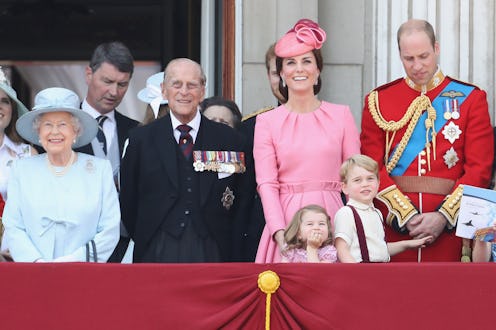Entertainment
Here’s Where Kate & Will's Kids — Including The New Baby — Fall in Line For The Throne

With Prince William and Kate Middleton's third child due soon, there's one question that's probably on the minds of fans of the royal family: Where are Prince William and Kate Middleton's children in line for the throne? The three of them could theoretically ascend to the throne, with Prince George currently in line after his father. Still, in order for Prince George to take the lead, Prince William himself would have to be out of the picture, so it's important not to get ahead of anything.
As The Sun explains, Prince Charles is Queen Elizabeth II's oldest child, which means he's next in line for the throne. That's true whether Queen Elizabeth II dies or leaves the throne of her own volition. And as the paper points out, some insiders think that Queen Elizabeth II could abdicate, entrusting the throne to her son while she's still alive. (The Queen is celebrating her 92nd birthday next month, and rumor has it that she might abdicate when she's 95.)
Either way, though, Prince Charles would take the throne in Queen Elizabeth II's departure from it. After that, things would fall to Prince William. If he were unable to assume the throne, Prince George would be next in line, followed by Princess Charlotte and then William and Middleton's baby on the way.
Prince Harry, meanwhile, slides further down the line of succession with each of his brother's children's births. That puts him in the line of succession after William and Middleton's children. And if Prince Harry and Meghan Markle have children, they'll fall in line after their dad. (For her part, Markle won't be in the line of succession for the throne after the wedding.)
And if you're wondering about Princess Charlotte's place in the line of succession, her position comes thanks to a recent change in protocol. After William and Middleton's 2011 wedding, Parliament and leaders of the 16 British Commonwealth countries voted to change a centuries-old rule about gender and royal succession. Previously, women in line for the throne could be outranked by younger brothers, but Prime Minister David Cameron introduced legislation to change that.
"These rules are outdated and need to change," Cameron said at the time, speaking about monarchy rules at the Commonwealth Heads of Government Meeting. "The idea that a younger son should become monarch instead of an elder daughter simply because he is a man just isn't acceptable any more." The Succession to the Crown Act was passed in 2013 and went into effect in 2015, just before Princess Charlotte's birth.
Whoever ends up ascending to the throne after Queen Elizabeth II will have some big shoes to fill. Queen Elizabeth II's coronation was in 1953, making her the longest-reigning monarch in the world. She became Queen after her father, King George VI, died in 1952.
Queen Elizabeth has also been married to Prince Philip, Duke of Edinburgh, since 1947. And their eldest child, Prince Charles, has set a succession record of his own, too. As the BBC points out, Prince Charles has served as heir apparent longer than any other person in British history. Still, not everyone thinks Prince Charles' age is a strength. There are some fans out there who think Prince Charles should pass the throne on to Prince William, whose approval rating tends to be higher than his father's.
That's all speculation, though. And besides, Queen Elizabeth II seems to be doing just fine at the moment. Fans of the royal family should be joyful about the fact that William and Middleton's third child is almost here — and that their children aren't subject to the previous antiquated gender roles of royal succession.